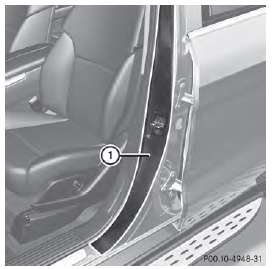Instruction labels for tires and loads
WARNING
Overloaded tires can overheat, causing a blowout. Overloaded tires can also impair the steering and driving characteristics and lead to brake failure. There is a risk of accident.
Observe the load rating of the tires. The load rating must be at least half of the GAWR of your vehicle. Never overload the tires by exceeding the maximum load.
Two instruction labels on your vehicle show the maximum possible load.
(1) The Tire and Loading Information placard is on the B-pillar on the driver's side. The Tire and Loading Information placard shows the maximum permissible number of occupants and the maximum permissible vehicle load. It also contains details of the tire sizes and corresponding pressures for tires mounted at the factory.
(2) The vehicle identification plate is on the B-pillar on the driver's side. The vehicle identification plate informs you of the gross vehicle weight rating. It is made up of the vehicle weight, all vehicle occupants, the fuel and the cargo. You can also find information about the maximum gross axle weight rating on the front and rear axle.
The maximum gross axle weight rating is the maximum weight that can be carried by one axle (front or rear axle). Never exceed the maximum load or the maximum gross axle weight rating for the front or rear axle.

1 B-pillar, driver's side
See also:
Switching the rear window wiper on/
off
■ Turn the SmartKey to position 1
or 2 in the ignition lock .
■ Turn switch : on the combination switch
to the corresponding position.
When the rear window wiper is switche ...
Immobilizer
X To activate with the SmartKey: remove
the SmartKey from the ignition lock.
■ To activate with KEYLESS-GO: switch the
ignition off and open the driver's door.
■ To deactivate: switch ...
Problems with the sliding sunroof
WARNING
If you close the sliding sunroof again immediately after it has been blocked
or reset, the sliding
sunroof closes with increased or maximum force. The reversing feature is then
not active. ...
